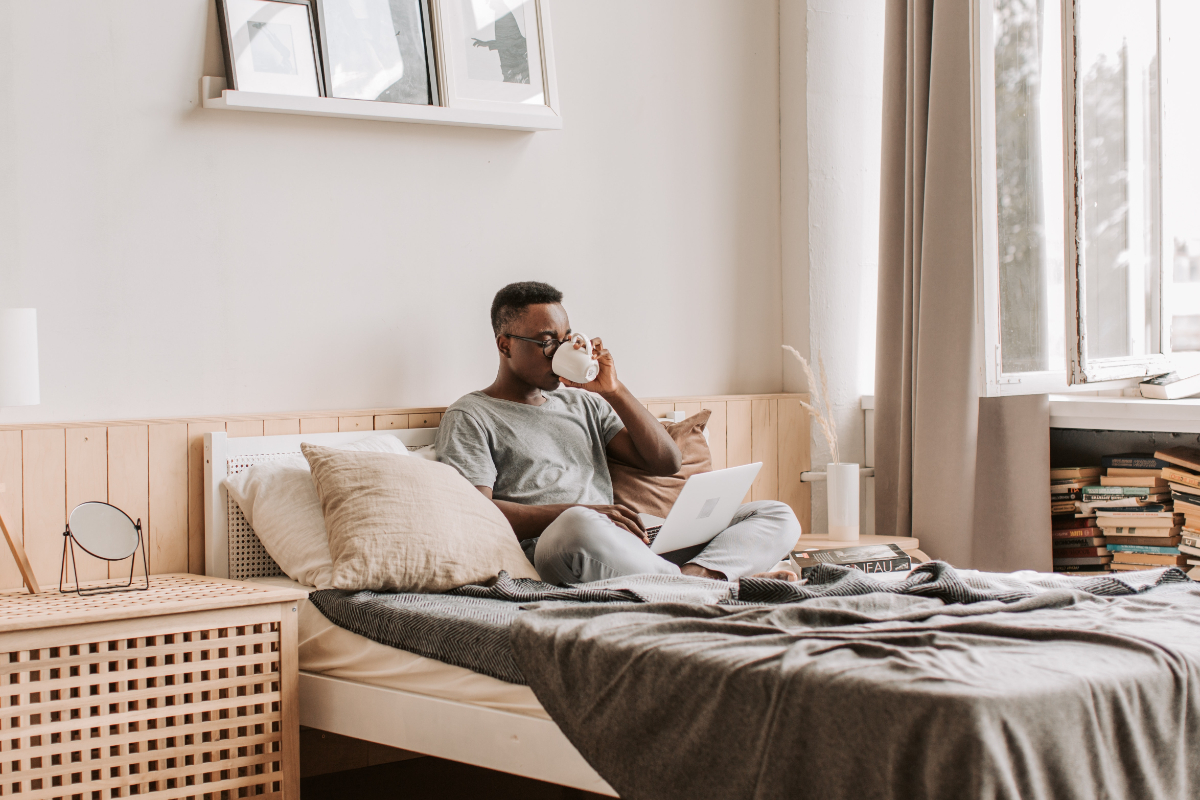Ever feel like you’re always busy but not getting much done at home?
You’re not alone.
In our bustling lives, managing time and tasks at home can be a real challenge.
But guess what?
It’s not just about crossing off items on your to-do list. It’s also about enjoying your personal time and living a more organized life.
We’ve put together a guide with 18 tips and strategies that can help you get more done at home and in life so you can finally enjoy yourself. Let’s dive in!
Table of Contents
How To Get More Things Done at Home
Develop a Good Morning Routine
How you start your day can set the tone for everything that follows. A good morning routine is like a secret weapon for productivity. It fuels your energy, clears your mind, and gears you up to face the day’s challenges head-on.
A “good” morning routine will look different for everyone but try to include a quick workout, a healthy breakfast, and a few minutes of meditation or journaling for stress relief.
Find what works for you and stick to it. You’ll be amazed at the boost in energy and your productivity levels!
Make a To-Do List
Visualizing your tasks is a powerful way to manage your day efficiently. Writing down what you need to accomplish can help you prioritize your tasks and keep track of your progress.
Start by jotting down everything you need to get done, no matter how big or small. This will give you a clear overview of your tasks and commitments for the day.
You can then arrange them according to their urgency or importance. Remember, a to-do list is not set in stone. You can always adjust it as needed throughout the day.
Choose What You Want To Focus on
Your to-do list probably includes big and important tasks as well as smaller but necessary ones. While it’s crucial to attend to all of them, it’s equally important to select the tasks that need immediate attention.
Ask yourself, “What are the tasks that will make the biggest difference if completed today?” Once you have your answer, make these your focus.
Not only will this approach help you manage your time effectively, but it will also ensure that you’re making significant progress toward your goals.
Prioritize the Most Important Things
It’s easy to feel overwhelmed by a long to-do list. To avoid this, try picking just 3 or 4 things to do per day. Reducing the number of items on your list doesn’t mean you’re doing less, it just means you’re focusing on those things that matter most.
Identify your top tasks and start with the Most Important Task (MIT). This could be something that has a strict deadline, a task that brings you closer to a specific goal, or something that will have the biggest impact on your day. Once you’ve done your MIT of the moment, move on to the next one.
By focusing on your MITs, you’ll improve your productivity and feel more accomplished at the end of the day.

Get Started By Doing Just One Thing
Ever looked at your to-do list and felt overwhelmed? We’ve all been there. But here’s a simple trick: start by doing just one thing.
Your one thing could be as simple as making the bed, washing the dishes, or responding to just one email. Or, it can be as big as a 1-hour workout or finally getting started on that project you’ve been postponing. The idea is to get the ball rolling and build momentum.
Once you’ve completed one task, you’ll likely feel more motivated to tackle the next one and then the next one, and so on.
This approach helps to minimize procrastination and it can also lead to big results by the end of the day!
Don’t Over-Commit
In our quest to get more done, it’s easy to fall into the trap of over-committing. But stuffing your schedule to the brim can lead to burnout and decreased productivity.
It’s important to remember that we all need downtime to recharge. The best way to keep your energy high throughout the day is to schedule regular breaks. Whether it’s a quick walk around the block or a few minutes of quiet reflection, these moments can actually boost your productivity and mood.
Plus, if you have some time blocks that are free from commitments, you can be more flexible in your day and don’t have to stress when things take longer than expected.
Be Realistic
One of the biggest productivity killers is unrealistic expectations.
We often underestimate how long tasks will take (by a lot!) and end up feeling stressed and rushed, leading to lower motivation and a drop in our mood.
To avoid this, try to overestimate the time it takes to complete each task on your list. It might mean you get fewer things done in a day, but the quality of your work will definitely improve. And isn’t it better to do a few things well than many things poorly?
Plus, you’ll feel less stressed and more in control.
Prepare for the Unexpected
Life is full of surprises, and not all of them are pleasant ones. That’s why it’s important to be flexible with your tasks and schedule.
Adapting to unexpected events is key to maintaining productivity at home. You might be in the middle of a task when, suddenly, something urgent comes up. Instead of panicking or getting frustrated, take a deep breath and reassess your priorities.
Also, don’t be too hard on yourself if you find certain tasks challenging. It’s okay to set them aside and revisit them later when you’re in a better mindset. Remember, the goal is not to get everything done perfectly but to get things done effectively.
Choose the Best Time of Day
Are you a morning person or a night owl?
Understanding your body clock and identifying your peak productivity hours can significantly improve your efficiency at home.
Some people (like me) are more focused and energetic in the morning, while others perform better in the afternoon or evening.
Figure out when you’re at your best and schedule your most important tasks during those hours. Getting more done at home (and in life) is all about working smarter, not harder.

Take Time for Self-Care
When we think about getting more done at home, we often think of to-do lists, decluttering, and efficient time management. But what if I told you one of the best productivity hacks is taking time for self-care?
That’s right! Self-care isn’t just about pampering yourself; it’s about recharging your mind and body so you can perform at your best.
Fortunately, self-care doesn’t have to mean expensive spa days or time-consuming hobbies. Actually, some of the best self-care activities are simple, quick, and cost next to nothing.
When you’re short on time (and cash), try something from this list:
- A 10-minute walk outside
- Meditating for 5 minutes
- A 15-minute nap
- Reading your favorite book
- Taking a bath
- Talking to a friend
- 15-minute coffee break
Don’t Multitask
The myth of multitasking has been debunked time and time again, but I’ll repeat it just for the sake of it – juggling multiple tasks at once doesn’t make you more productive. In fact, it can lead to wasted time, more mistakes, and stress.
When working on your MIT, whether it’s cleaning, gardening, working on a report, or studying for an exam, focus only on that thing. You might initially feel that you’re doing less, but pay attention, and you’ll eventually see your productivity soar!
Eliminate Distractions
At any given moment, there are SO many things vying for our attention. I mean, distractions are everywhere, especially when you’re at home. From the playful antics of your kids to the never-ending notifications on your smartphone, these interruptions can make it challenging to stay focused and productive.
So, how can you minimize interruptions and boost your focus?
The first step is to identify what’s stealing your attention. Is it the constant chatter on the TV? Or maybe it’s the pile of laundry that’s been sitting in the corner, begging for your attention. Once you’ve pinpointed the culprits, it’s time to take action.
Consider creating a dedicated workspace at home. You don’t need a separate room; even a small private corner can improve your focus. The key is to make this space as distraction-free as possible. Keep it tidy, have all your work essentials within reach, and make it a no-go zone for kids and pets during your work hours.
Next, turn off those annoying notifications. Yes, it’s tempting to check every email or social media update that pops up, but it’s a surefire way to lose focus. Set specific times to check your messages and stick to your schedule!
You can also let friends and family know when you’re doing something important and ask them not to interrupt you or “zone out” by wearing noise-canceling headphones.
Batch Similar Errands/Work
Another effective strategy to get more done at home is to batch similar tasks together. This method, known as “batching,” can drastically improve your efficiency and save you a lot of time.
For instance, you can group all your cleaning tasks together, sort all mail at once, or run all your errands in one go. By doing so, you reduce the time spent switching between tasks, allowing you to focus and get more done.
Use the 2-Minute Rule
Ever heard of David Allen’s 2-minute rule? It’s a simple yet powerful productivity hack.
The rule is pretty straightforward – if something takes less than two minutes to complete, do it immediately.
This technique is great for clearing small tasks off your to-do list, freeing up your time and mental space for larger, more complex tasks.
Simplify Things
A complex life is a messy life, and it can lead to unnecessary stress and inefficiency. By simplifying your tasks, you can make your life easier and more manageable.
Consider streamlining your activities. For instance, setting up direct debit for your bills can save you time and prevent late payments. Or perhaps you can automate some of your tasks, like having groceries delivered weekly or using smart home devices to manage your household chores.
The key is to eliminate unnecessary steps and make your life as straightforward as possible. You’ll be surprised at the amount of time you can free up by simplifying things.
Plan for Tomorrow Today
One of the best ways to improve your productivity is to plan your day in advance. By setting your intentions for the next day, you can wake up with a clear mind and a solid plan. Not only does this save you time, but it also helps you stay focused and motivated.
Before you go to bed, take a few minutes to jot down your top priorities and goals for the next day. This could be anything from completing a work project to cleaning the kitchen. Having a plan will give you a sense of direction and purpose, and it will make your day run much smoother.
Declutter Every Day
Clutter isn’t just physical; it’s mental, too. A cluttered environment can lead to a cluttered mind, making it hard for you to focus and be productive. That’s why it’s so important to declutter regularly.
Make it a habit to tidy up a little each day. This could mean folding the laundry and putting it away as soon as it’s dry, emptying the dishwasher after the cycle is complete, or organizing your desk at the end of your workday.
By keeping your environment clean and orderly, you’ll be able to think more clearly and get more done.
Get Stuff Done the Night Before
There’s a lot to be said for the old adage, “Don’t put off until tomorrow what you can do today.”
One of the best ways to boost your productivity and organization at home is to get things done the night before. This strategy saves you time, reduces stress, and ensures smoother workflows, especially if you need to work or study the next day.
So, what can you do the night before?
Well, there are many things you can do. For instance, you could prepare your meals ahead of time. This will save you cooking and cleaning time but also ensures you have a healthy meal ready to go.
You could also lay out your clothes for the next day, reducing decision-making time in the morning. If you have kids, consider packing their lunch boxes or setting out their school clothes.
If you’re someone who can’t stand the sight of dirty dishes or dusty cupboards, get all that out of the way the evening before as well. These small things don’t take long but they allow you to prep your home (and your mind) for the following day.
Conclusion
Getting more things done at home isn’t just about racing against the clock or cramming as many tasks as possible into your day. It’s about intentional time management, organization, and creating a balance that allows you to enjoy your personal time while also completing your tasks efficiently.
From developing a good morning routine to preparing for the next day the night before, the strategies we’ve discussed in this article are designed to help you lead a more productive and organized life.
The key to getting more done is to find productivity hacks that work for you and stick to them. With a little planning and discipline, you’ll be amazed at how much more you can accomplish!





